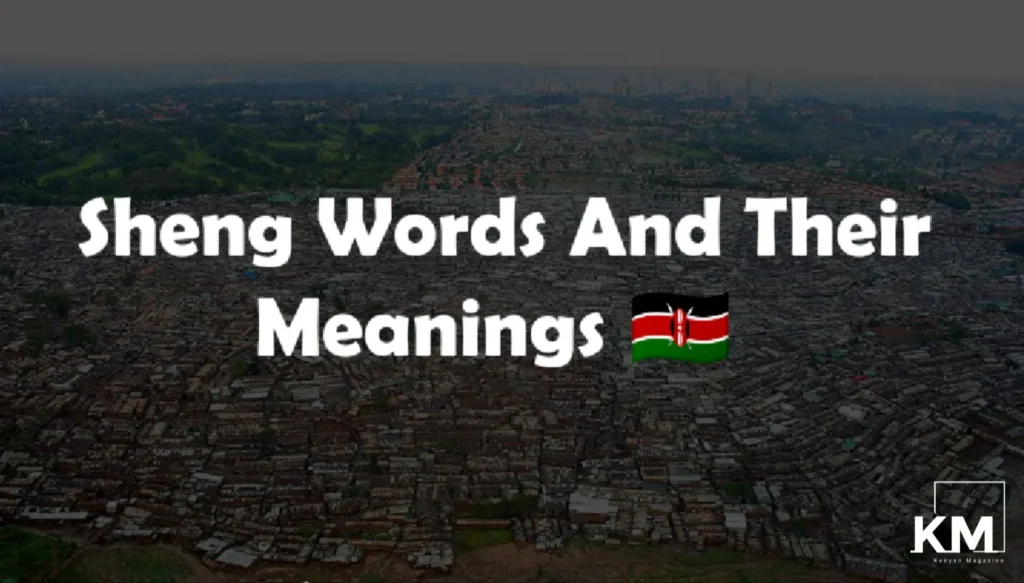In 2024, Kenyan slang scene exploded with fresh phrases that are now essential to everyday conversations, especially among the youth.
These expressions are not just words—they’re a whole vibe, reflecting the pulse of the nation, from political protests to viral TikTok moments.

Here’s a breakdown of the hottest phrases, Kenyan slang and their origins:
Anguka Nayo
Translation: “Fall with it.”
This phrase became the anthem of 2024, describing a person who has flopped hard or made a monumental mistake.
It was birthed by rap duo Wadagliz during the anti-finance bill demonstrations, and its popularity soared in moments of chaos and comedy. When you mess up big time, you “anguka nayo”—and trust, it’s a whole mood.
Kufinish Kumalo
This one’s straight fire! Mixing Swahili and sheng, it means to finish something completely, and it became the ultimate expression of total domination.
Inspired by Tipsy G’s hit track, “Kufinish Kumalo”, the phrase skyrocketed into the mainstream and is now used whenever someone goes all in, whether it’s a meal, a party, or just finishing up life in general.
Maneno Haya Si Mageni Jijini
Translation: “These matters are not new in the city.”
This phrase is a sharp reminder that some things are just a normal part of urban life. It’s your go-to line when you’re trying to tell someone, “This isn’t new, it’s been happening forever!”
A perfect blend of wisdom and street smarts that says, “You’ve seen it all before.”
Hi Kababa
“Kababa” translates to “little man”, but throw a cheeky “Hi” before it, and you’ve got an instant viral sensation. Influencer Sandy Kahush coined this modern term of endearment, and it caught fire across social media.
Now, when you want to show love or affection to a younger dude, you hit them with that “Hi Kababa”—and yes, it’s all kinds of cute.
Very Demure
Borrowed from English, this phrase is sarcastically used to describe someone who’s acting modest but doing the most. When you want to throw shade at someone pretending to be humble, you drop a “very demure,” and let the eye rolls do the talking.
Kumabuvu Zangu Mbwa Mimi
Translation: “What the heck?!”
When you want to express utter disbelief or frustration, this one’s for you. Combining Swahili with intense emotion, this phrase erupted from rapper Stevo Simple Boy, becoming the go-to expression for “this situation is absurd!”
Trust us, when things go sideways, this phrase sums it up perfectly.
Afande Please
Inspired by the word “Afande” (a respectful term for a police officer or soldier), this phrase is used humorously when you need to beg for leniency or avoid a sticky situation.
It’s playful and sarcastic, often uttered when you’re trying to dodge trouble with the authorities—and yes, it’s as hilarious as it sounds.
Wacha Aseme Imtoke
Translation: “Let it come out.”
Got something to say? Feel like expressing yourself? Then “wacha aseme imtoke” is your motto.
This phrase, born from a viral TikTok sound, encourages people to let their emotions flow freely, whether that’s crying, speaking your mind, or just letting something happen naturally.
Watu Si Wajinga Buana
Translation: “People are not fools, man.”
This one’s a statement. When you need to remind someone that Kenyans are sharp and not easily fooled, you drop this line. It’s all about asserting that we’re not naive—we see through the BS.
Utagongewa
Translation: “You might get taken.”
A warning shot, “utagongewa” is used when you’re telling someone that they might lose their partner to someone else—like, ‘Don’t say I didn’t warn you.’
This Kenyan slang got that playful, yet cutting edge that everyone needs in their back pocket.
Chop Rice
Straight outta the streets, “chop rice” means to eat rice, but in online slang, it’s used to describe taking the less sweet or less exciting side of things.
Think: settling for something that’s okay, but not amazing. It’s the kind of phrase that keeps things real, even when things aren’t going your way.
Gotha
Sheng term from reggae MC Zendiabo, meaning “do it again.” This one’s all about asking for a repeat performance, and it’s been immortalized in a song.
You know when a track hits hard? You scream, “gotha!”, and get ready for round two.
The People Shall
This phrase is incomplete—but it’s got power. It’s become a popular chant in political circles, symbolizing the indomitable strength of the people.
Whether you’re protesting or making a point, “the people shall” is a call to arms, demanding justice and collective action.
Gen Z
Gen Z made their mark in 2024, leading the charge against the Finance Bill 2024 with protests that resonated across the nation from June to August. Born between 1997 and 2012, this generation became the unofficial face of resistance, with a newfound passion for civic engagement and a deep dive into governance systems.
To many, Gen Z became the symbol of rebellion—standing up against the establishment, with every act of defiance being linked back to the “Zoomers.”
“Things are Boiling Nicely”
Political analyst Gabriel Oguda’s famous phrase—“things are boiling nicely”—took on a life of its own during the protests, capturing the growing intensity of the demonstrations.
As the momentum grew, social media users embraced the phrase, tagging every positive development in the protests with this catchy slogan. It was the perfect description for the bubbling wave of change.
“Leta Number Tumsalimie/ Ndiyo Hii Number Msalimieni Kidogo”
As the protests raged on, another viral catchphrase emerged. Kenyans began sharing the phone numbers of their political leaders, demanding accountability and holding them responsible for their actions.
The phrase “leta number tumsalimie/ ndiyo hii number msalimieni kidogo” became a symbol of citizens “greeting” politicians in the most direct way possible, making their voices heard in a bold new way.
“Nimekumark/Kama Umenimark Like Hii Post”
The dating scene of 2024 also saw the rise of a fresh phrase that captured the attention of the younger generation. “Nimekumark” became the go-to term for when “manifesting” didn’t go as planned, signaling it was time to take matters into your own hands.
The phrase sparked countless conversations on both social media and in person, as Gen Z took control of their romantic lives in the boldest way possible.
“Usiguse Murima”
Despite his political downfall, Rigathi Gachagua gave Kenya a gift that would keep on giving: a hilarious catchphrase that turned into meme gold. “Usiguse murima,” originally part of his effort to solidify his influence in Mt. Kenya, quickly spread across the nation.
The Kenyan slang became an evergreen comedic tool, applied to everything from politics to everyday life. Even after Gachagua’s impeachment, the legacy of his words lived on, much to the amusement of Kenyans everywhere.
“Misheveve”
And then there was the word “misheveve,” which made an unexpected comeback in 2024. Originating from a viral video, this term, meaning pumpkin leaves, became an internet sensation. The clip, featuring a village chief recounting a bizarre domestic dispute, turned this seemingly innocent word into an online phenomenon.
“Sasa Si Ni Mi Nakushow”
Translation: “I’m the unverified source of information, just trust me.”
This phrase is the perfect way to casually drop some questionable info while expecting others to just take your word for it.
It’s a playful admission that the facts might not be official or reliable, but hey, you can still count on it—just roll with it!
“Misheveve” replaced old catchphrases like “weka za kabej” and quickly became the go-to term for humor and everyday banter among Kenyans.
These 2024 Kenyan slang expressions aren’t just words—they’re the rhythm of the streets, the pulse of the people, and a reflection of how language evolves.
2024 was undeniably the year of bold words, Kenyan slang and unforgettable catchphrases, with Gen Z at the forefront of this cultural revolution.

Whether political, personal, or just for laughs, these phrases reflect the pulse of a generation that’s not afraid to speak up, speak out, and shake things up!
Whether you’re dodging the authorities, claiming your space, or calling out nonsense, these Kenyan slang are here to stay. So, which one will you be using next?



